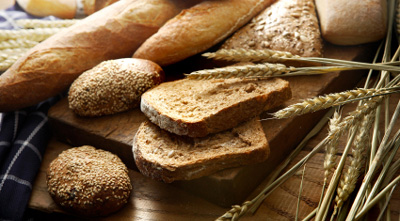Our nutrition expert Stefanie fills us in on what it means to be wheat or gluten-free and what symptoms indicate that maybe you should be …
xxx
WHEAT OR GLUTEN FREE?
A little confused about what it actually means to be wheat-free? How about gluten-free? Here are the whats and the whys …
WHEAT
What is wheat-free?
“Wheat-free” means that a person avoids all foods containing wheat. Foods containing wheat are anything made with white or whole wheat flour, such as: cookies, cakes, breads, tortillas, pizza, pasta, pancakes, waffles, most fried food, tempura, dumplings, wontons, etc.; anything made with bulghur such as tabouli; wheat berries; cous cous; sauces that are typically thickened with white flour; soy sauce (although San-J has a wheat-free option).
Why should someone want avoid it?
Sensitivity to wheat typically results in gastrointestinal distress such as bloating, gas, constipation, diarrhea, reflux; skin issues such as rashes; and allergies/asthma such as congestion and wheezing.
If a person is symptomatic and eliminates wheat, typically after a week symptoms should start to improve. It can sometimes be dramatic.
What are some alternative to wheat?
Don’t worry, there are plenty of great alternatives to wheat containing foods including: breads, tortillas, pasta, pancakes, waffles, etc. Just make sure to read labels. Most products that are wheat-free will say so on the package. Also, anything that says gluten-free is also wheat-free (even if it doesn’t say so).
GLUTEN
What is Gluten-free?
Gluten-free means that a person avoids all foods containing gluten. Gluten is the general term used to describe the protein found in many grains including wheat, rye, barley, spelt, kamut, oat, triticale, semolina, pumpernickel, and farro.
Why avoid Gluten?
The absorptive surface of the small intestine is damaged by gluten resulting in malabsorption of carbohydrates, fat, protein, vitamins, and minerals, all of which are needed for good health (see the Gluten Free Diet by Shelley Case). This condition, called Celiac Disease (or Celiac Sprue), is an autoimmune disease that can be very difficult to diagnose as symptoms can range across everything from diarrhea and constipation to chronic fatigue and depression. Celiac is a serious disease that can be diagnosed through blood tests and intestinal biopsy. Should you suspect that you have, seek medical attention immediately.
Please note that there is a large population of people who are sensitive to gluten though don’t have full blown celiac disease. These people also benefit from a gluten-free diet. Again, seek medical attention if you suspect you are sensitive to gluten.
What are alternatives to Gluten?
There are many amazing products on the market that are gluten-free including breads, pastas, cookies, cakes, pancakes, waffles, etc. It is VERY IMPORTANT to read labels. Take note that a product that says “wheat -free” only is NOT necessarily gluten-free.
Great resources to learn more about wheat and gluten-free living are “The Gluten Free Diet” by Shelley Case, RD and “Wheat-Free, Worry-Free: the Art of Happy Healthy Gluten-Free Living” by Donna Korn.

